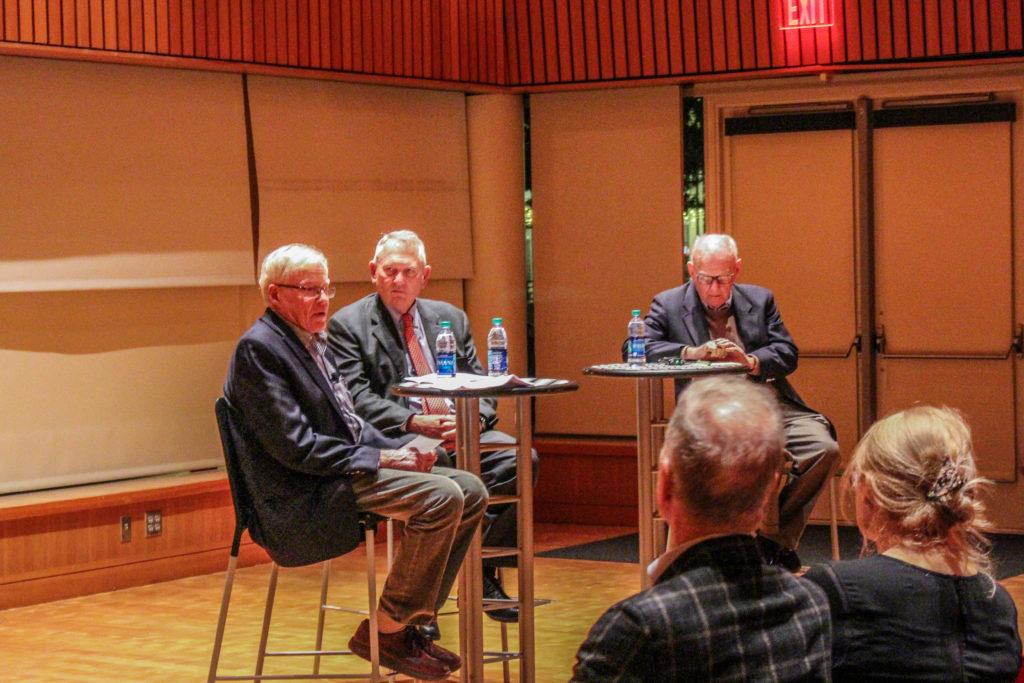
On Dec. 3, the Rosenfield Program in Public Affairs, International Relations and Human Rights hosted “To Know Joe: Joe Rosenfield and the Community He Built,” a panel discussion about the life and legacy of Joe Rosenfield ’25.
Joe Rosenfield’s influence can be felt across Grinnell’s campus—in the events hosted by the Rosenfield Program—in the meals eaten in the Joe Rosenfield Center—even the HSSC feels his financial influence, though he died in 2000. The AAA credit rating Rosenfield built facilitated the necessary loans to build the massive new building. One panelist even suggested that Grinnell College would have gone bankrupt without Rosenfield.
Joe Rosenfield served on Grinnell’s Board of Trustees from 1941 to his death in 2000, growing the endowment from $78,000 to over $1 billion with his financial acumen. He was also active in Democratic politics, supported Planned Parenthood and made President Nixon’s enemies list for giving money to Harold Hughes. He personally paid the legal fees for the students in the Tinker v. Des Moines case, which went to the United States Supreme Court and solidified free speech in schools.
The panelists were George Drake, former Grinnell president, trustee and history professor, author of Mentor: Life and Legacy of Joe Rosenfield; Michael Gartner, a Pulitzer-winning journalist, former CEO of NBC and current owner of the Iowa Cubs (the minor-league affiliate of the Chicago Cubs); and Jim Cownie, a Des Moines millionaire and philanthropist who suggested writing a biography of Rosenfield and paid for it to happen.
The panelists talked about Rosenfield, his investments and his time spent at the Des Moines Club, a prestigious members-only club in Iowa’s capital. Cownie made his money as a cofounder of the cable company Heritage, and met Rosenfield through a friend’s father. Rosenfield was then on the board of Younkers, a department store that now exists only online. Rosenfield convinced the Younkers board to invest in Heritage, and everyone involved made a lot of money.
“It’s not too surprising given that time frame that the power brokers were men, and those with the resources to invest and take the risk were men,” said Barbara Trish, Political Science, and director of the Rosenfield Program. “At a minimum, I feel fortunate that Grinnell College was the beneficiary of some of those really good deals that they made.”
Gartner reminisced fondly about how people from small towns all around Iowa saw elevators and escalators for the first time when they came to Younkers to look into the decorated windows during the Christmas season.
Rosenfield was one of six Jewish students that attended Grinnell at the time, and reportedly joked about his status as a persecuted religious minority. According to Drake, he was excluded from the prestigious Wakonda Club for his faith, bought an apartment near the club, and quipped: “I overlook them now. They overlooked me for many years.”
“He was a really quirky guy, but he did good things,” Trish said. “He did good things with his money, with his resources.”
Mentor: Life and Legacy of Joe Rosenfield by George Drake is available at both Burling and Drake libraries, or at the Pioneer Bookshop for $20.






















































Dennis Harrington • Dec 13, 2019 at 12:06 pm
Was a recording, audio or video, made of the event? Is it available to folks outside the immediate campus? Just curious. It’d be a shame to lose this institutional memory. Thanks for this write-up.